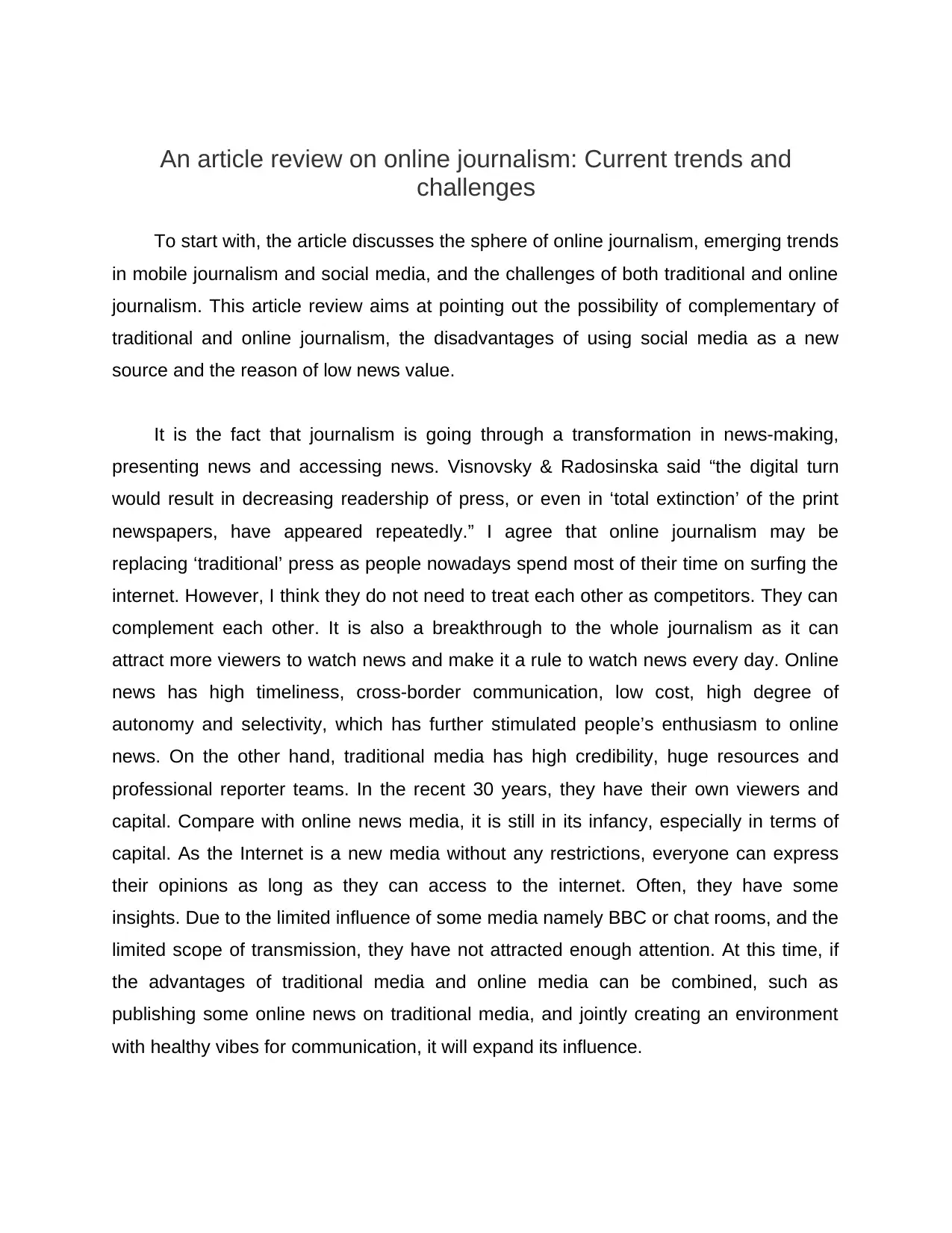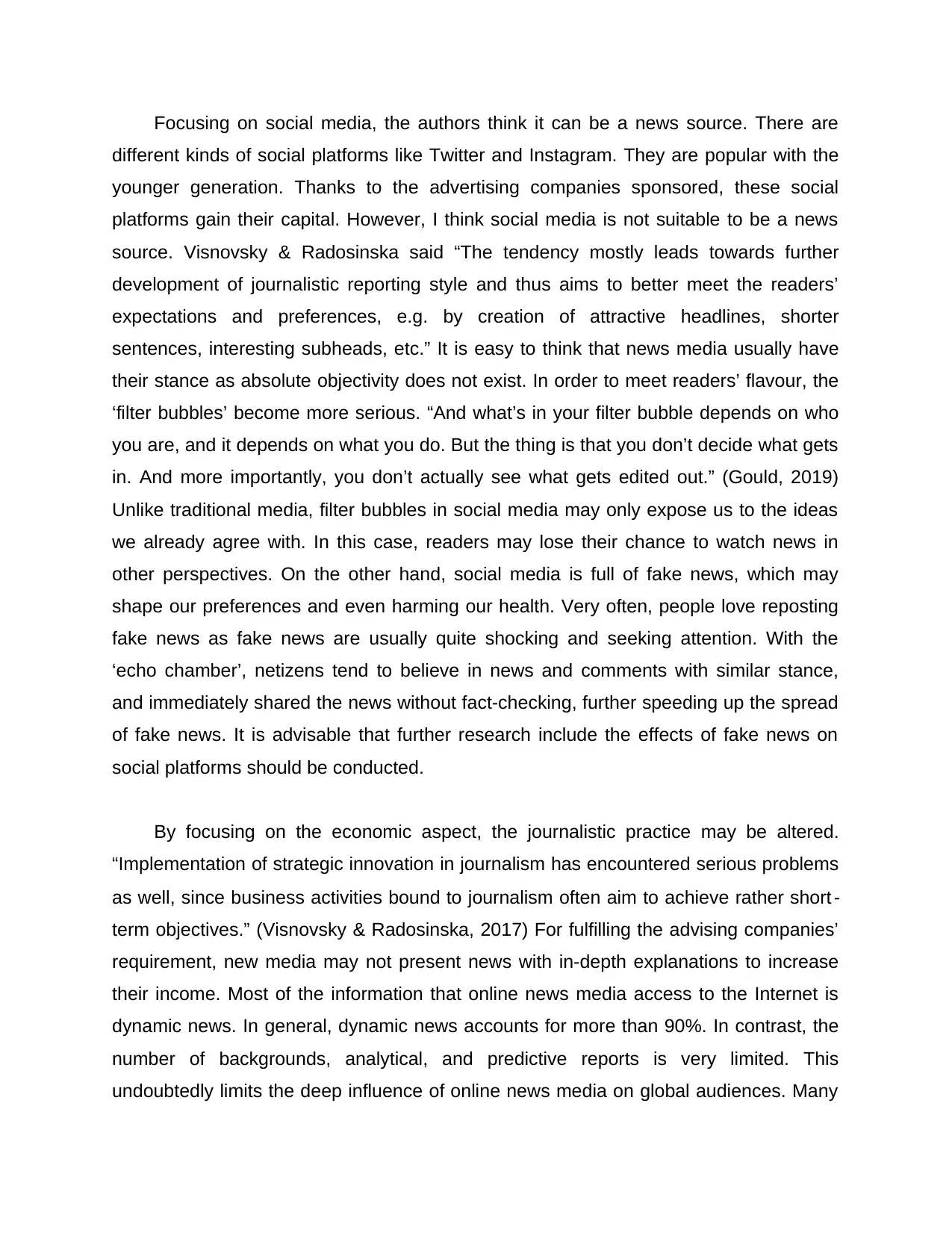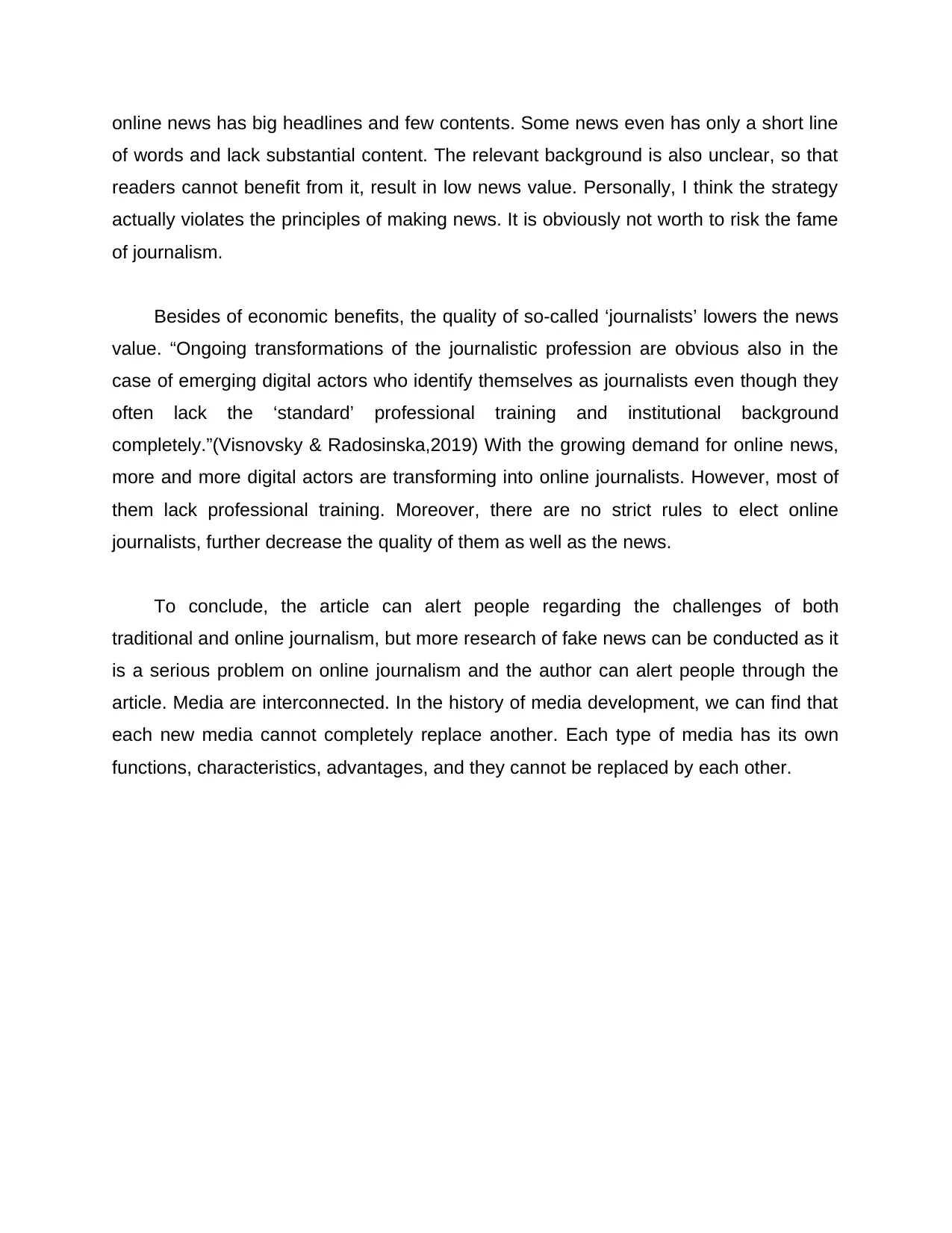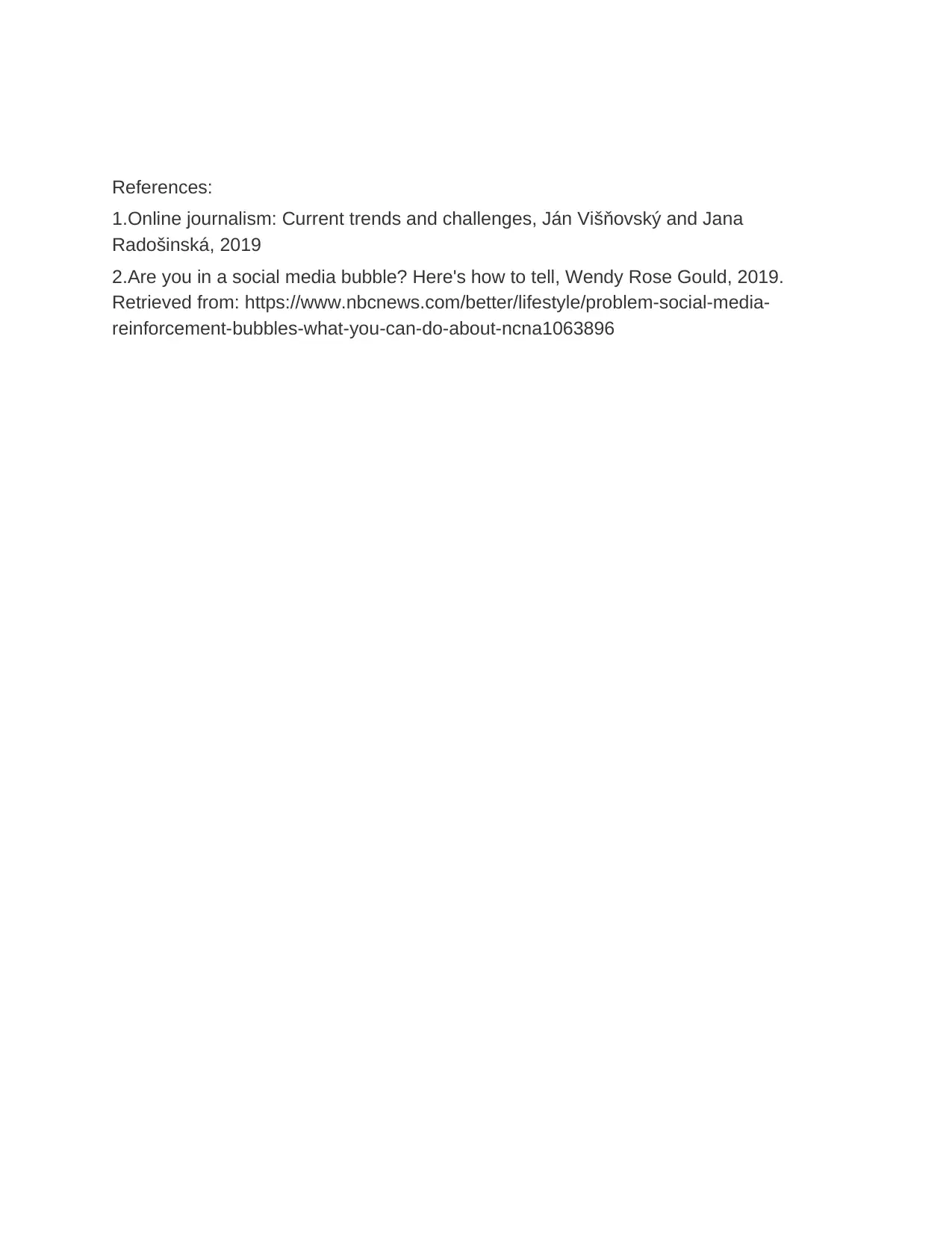Article Review: Trends and Challenges in Online Journalism
VerifiedAdded on 2021/11/23
|4
|1180
|369
Report
AI Summary
This report provides an article review on online journalism, discussing the evolution of news-making and the relationship between traditional and online media. It highlights the potential for complementarity between the two, emphasizing the advantages of online news, such as timeliness and low cost, while acknowledging the credibility of traditional media. The review also critically examines the use of social media as a news source, pointing out the issues of filter bubbles and the spread of fake news. Furthermore, the report touches on the economic aspects of online journalism, where short-term objectives can compromise the quality of news, and the impact of less-qualified journalists. The review concludes with a call for further research on fake news and the interconnectedness of media, suggesting that each type of media has unique functions that cannot be replaced.

An article review on online journalism: Current trends and
challenges
To start with, the article discusses the sphere of online journalism, emerging trends
in mobile journalism and social media, and the challenges of both traditional and online
journalism. This article review aims at pointing out the possibility of complementary of
traditional and online journalism, the disadvantages of using social media as a new
source and the reason of low news value.
It is the fact that journalism is going through a transformation in news-making,
presenting news and accessing news. Visnovsky & Radosinska said “the digital turn
would result in decreasing readership of press, or even in ‘total extinction’ of the print
newspapers, have appeared repeatedly.” I agree that online journalism may be
replacing ‘traditional’ press as people nowadays spend most of their time on surfing the
internet. However, I think they do not need to treat each other as competitors. They can
complement each other. It is also a breakthrough to the whole journalism as it can
attract more viewers to watch news and make it a rule to watch news every day. Online
news has high timeliness, cross-border communication, low cost, high degree of
autonomy and selectivity, which has further stimulated people’s enthusiasm to online
news. On the other hand, traditional media has high credibility, huge resources and
professional reporter teams. In the recent 30 years, they have their own viewers and
capital. Compare with online news media, it is still in its infancy, especially in terms of
capital. As the Internet is a new media without any restrictions, everyone can express
their opinions as long as they can access to the internet. Often, they have some
insights. Due to the limited influence of some media namely BBC or chat rooms, and the
limited scope of transmission, they have not attracted enough attention. At this time, if
the advantages of traditional media and online media can be combined, such as
publishing some online news on traditional media, and jointly creating an environment
with healthy vibes for communication, it will expand its influence.
challenges
To start with, the article discusses the sphere of online journalism, emerging trends
in mobile journalism and social media, and the challenges of both traditional and online
journalism. This article review aims at pointing out the possibility of complementary of
traditional and online journalism, the disadvantages of using social media as a new
source and the reason of low news value.
It is the fact that journalism is going through a transformation in news-making,
presenting news and accessing news. Visnovsky & Radosinska said “the digital turn
would result in decreasing readership of press, or even in ‘total extinction’ of the print
newspapers, have appeared repeatedly.” I agree that online journalism may be
replacing ‘traditional’ press as people nowadays spend most of their time on surfing the
internet. However, I think they do not need to treat each other as competitors. They can
complement each other. It is also a breakthrough to the whole journalism as it can
attract more viewers to watch news and make it a rule to watch news every day. Online
news has high timeliness, cross-border communication, low cost, high degree of
autonomy and selectivity, which has further stimulated people’s enthusiasm to online
news. On the other hand, traditional media has high credibility, huge resources and
professional reporter teams. In the recent 30 years, they have their own viewers and
capital. Compare with online news media, it is still in its infancy, especially in terms of
capital. As the Internet is a new media without any restrictions, everyone can express
their opinions as long as they can access to the internet. Often, they have some
insights. Due to the limited influence of some media namely BBC or chat rooms, and the
limited scope of transmission, they have not attracted enough attention. At this time, if
the advantages of traditional media and online media can be combined, such as
publishing some online news on traditional media, and jointly creating an environment
with healthy vibes for communication, it will expand its influence.
Paraphrase This Document
Need a fresh take? Get an instant paraphrase of this document with our AI Paraphraser

Focusing on social media, the authors think it can be a news source. There are
different kinds of social platforms like Twitter and Instagram. They are popular with the
younger generation. Thanks to the advertising companies sponsored, these social
platforms gain their capital. However, I think social media is not suitable to be a news
source. Visnovsky & Radosinska said “The tendency mostly leads towards further
development of journalistic reporting style and thus aims to better meet the readers’
expectations and preferences, e.g. by creation of attractive headlines, shorter
sentences, interesting subheads, etc.” It is easy to think that news media usually have
their stance as absolute objectivity does not exist. In order to meet readers’ flavour, the
‘filter bubbles’ become more serious. “And what’s in your filter bubble depends on who
you are, and it depends on what you do. But the thing is that you don’t decide what gets
in. And more importantly, you don’t actually see what gets edited out.” (Gould, 2019)
Unlike traditional media, filter bubbles in social media may only expose us to the ideas
we already agree with. In this case, readers may lose their chance to watch news in
other perspectives. On the other hand, social media is full of fake news, which may
shape our preferences and even harming our health. Very often, people love reposting
fake news as fake news are usually quite shocking and seeking attention. With the
‘echo chamber’, netizens tend to believe in news and comments with similar stance,
and immediately shared the news without fact-checking, further speeding up the spread
of fake news. It is advisable that further research include the effects of fake news on
social platforms should be conducted.
By focusing on the economic aspect, the journalistic practice may be altered.
“Implementation of strategic innovation in journalism has encountered serious problems
as well, since business activities bound to journalism often aim to achieve rather short ‐
term objectives.” (Visnovsky & Radosinska, 2017) For fulfilling the advising companies’
requirement, new media may not present news with in-depth explanations to increase
their income. Most of the information that online news media access to the Internet is
dynamic news. In general, dynamic news accounts for more than 90%. In contrast, the
number of backgrounds, analytical, and predictive reports is very limited. This
undoubtedly limits the deep influence of online news media on global audiences. Many
different kinds of social platforms like Twitter and Instagram. They are popular with the
younger generation. Thanks to the advertising companies sponsored, these social
platforms gain their capital. However, I think social media is not suitable to be a news
source. Visnovsky & Radosinska said “The tendency mostly leads towards further
development of journalistic reporting style and thus aims to better meet the readers’
expectations and preferences, e.g. by creation of attractive headlines, shorter
sentences, interesting subheads, etc.” It is easy to think that news media usually have
their stance as absolute objectivity does not exist. In order to meet readers’ flavour, the
‘filter bubbles’ become more serious. “And what’s in your filter bubble depends on who
you are, and it depends on what you do. But the thing is that you don’t decide what gets
in. And more importantly, you don’t actually see what gets edited out.” (Gould, 2019)
Unlike traditional media, filter bubbles in social media may only expose us to the ideas
we already agree with. In this case, readers may lose their chance to watch news in
other perspectives. On the other hand, social media is full of fake news, which may
shape our preferences and even harming our health. Very often, people love reposting
fake news as fake news are usually quite shocking and seeking attention. With the
‘echo chamber’, netizens tend to believe in news and comments with similar stance,
and immediately shared the news without fact-checking, further speeding up the spread
of fake news. It is advisable that further research include the effects of fake news on
social platforms should be conducted.
By focusing on the economic aspect, the journalistic practice may be altered.
“Implementation of strategic innovation in journalism has encountered serious problems
as well, since business activities bound to journalism often aim to achieve rather short ‐
term objectives.” (Visnovsky & Radosinska, 2017) For fulfilling the advising companies’
requirement, new media may not present news with in-depth explanations to increase
their income. Most of the information that online news media access to the Internet is
dynamic news. In general, dynamic news accounts for more than 90%. In contrast, the
number of backgrounds, analytical, and predictive reports is very limited. This
undoubtedly limits the deep influence of online news media on global audiences. Many

online news has big headlines and few contents. Some news even has only a short line
of words and lack substantial content. The relevant background is also unclear, so that
readers cannot benefit from it, result in low news value. Personally, I think the strategy
actually violates the principles of making news. It is obviously not worth to risk the fame
of journalism.
Besides of economic benefits, the quality of so-called ‘journalists’ lowers the news
value. “Ongoing transformations of the journalistic profession are obvious also in the
case of emerging digital actors who identify themselves as journalists even though they
often lack the ‘standard’ professional training and institutional background
completely.”(Visnovsky & Radosinska,2019) With the growing demand for online news,
more and more digital actors are transforming into online journalists. However, most of
them lack professional training. Moreover, there are no strict rules to elect online
journalists, further decrease the quality of them as well as the news.
To conclude, the article can alert people regarding the challenges of both
traditional and online journalism, but more research of fake news can be conducted as it
is a serious problem on online journalism and the author can alert people through the
article. Media are interconnected. In the history of media development, we can find that
each new media cannot completely replace another. Each type of media has its own
functions, characteristics, advantages, and they cannot be replaced by each other.
of words and lack substantial content. The relevant background is also unclear, so that
readers cannot benefit from it, result in low news value. Personally, I think the strategy
actually violates the principles of making news. It is obviously not worth to risk the fame
of journalism.
Besides of economic benefits, the quality of so-called ‘journalists’ lowers the news
value. “Ongoing transformations of the journalistic profession are obvious also in the
case of emerging digital actors who identify themselves as journalists even though they
often lack the ‘standard’ professional training and institutional background
completely.”(Visnovsky & Radosinska,2019) With the growing demand for online news,
more and more digital actors are transforming into online journalists. However, most of
them lack professional training. Moreover, there are no strict rules to elect online
journalists, further decrease the quality of them as well as the news.
To conclude, the article can alert people regarding the challenges of both
traditional and online journalism, but more research of fake news can be conducted as it
is a serious problem on online journalism and the author can alert people through the
article. Media are interconnected. In the history of media development, we can find that
each new media cannot completely replace another. Each type of media has its own
functions, characteristics, advantages, and they cannot be replaced by each other.
⊘ This is a preview!⊘
Do you want full access?
Subscribe today to unlock all pages.

Trusted by 1+ million students worldwide

References:
1.Online journalism: Current trends and challenges, Ján Višňovský and Jana
Radošinská, 2019
2.Are you in a social media bubble? Here's how to tell, Wendy Rose Gould, 2019.
Retrieved from: https://www.nbcnews.com/better/lifestyle/problem-social-media-
reinforcement-bubbles-what-you-can-do-about-ncna1063896
1.Online journalism: Current trends and challenges, Ján Višňovský and Jana
Radošinská, 2019
2.Are you in a social media bubble? Here's how to tell, Wendy Rose Gould, 2019.
Retrieved from: https://www.nbcnews.com/better/lifestyle/problem-social-media-
reinforcement-bubbles-what-you-can-do-about-ncna1063896
1 out of 4
Related Documents
Your All-in-One AI-Powered Toolkit for Academic Success.
+13062052269
info@desklib.com
Available 24*7 on WhatsApp / Email
![[object Object]](/_next/static/media/star-bottom.7253800d.svg)
Unlock your academic potential
Copyright © 2020–2026 A2Z Services. All Rights Reserved. Developed and managed by ZUCOL.





